Tamara PimentelAPTN NewsA winding bumpy dirt road leads to Janice Antoine’s sprawling farmland on the Coldwater Indian Band reserve where several two-feet-tall red cement poles poke out of the ground.They’re remnants of repairs to an oil leak on the Trans Mountain pipeline running underneath the property.It has been almost four years since Antoine and her husband, Percy Joe, learned of the “anomaly” – Kinder Morgan’s term for the leak – and they are still waiting for the Texas oil giant to properly clean up the site.They say the remediation work has harmed their hay harvest, cost them revenue and left them wondering how much the oil spill has damaged their property.“Four of those precious years and the use of this field is gone,” says Antoine. “I’m never going to get that back.”
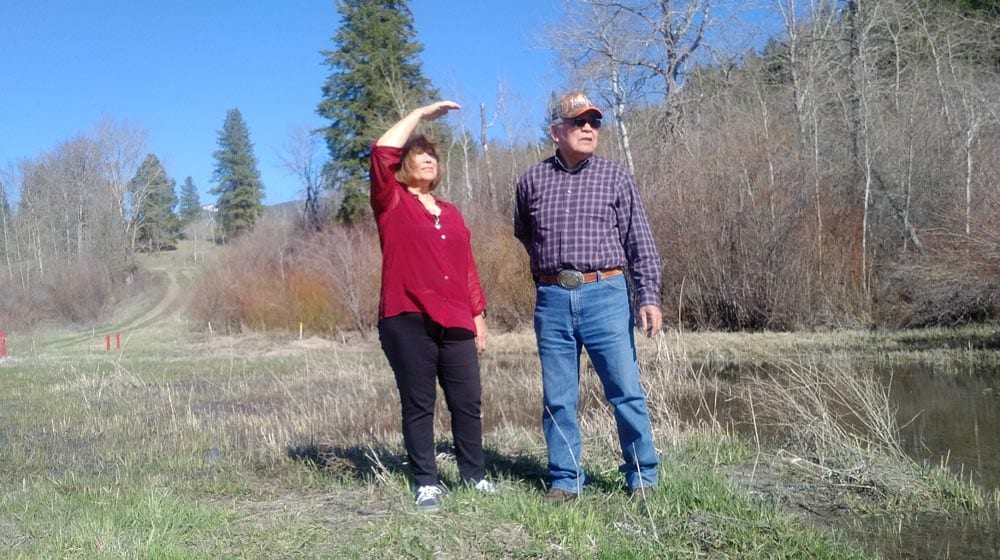
As the federal government, Alberta and B.C. wage high-level political wars over the $7.4-billion Trans Mountain pipeline expansion project, this couple from the 350-member reserve near Merritt, B.C. has been quietly fighting its own battle with Kinder Morgan.In August 2014, workers started digging into the site to fix the oil leak and test the area for contamination.“As it turns out, it was more extensive than they originally thought,” says Antoine.They dug a wide, open pit that raised safety concerns for the workers leasing the land and harvesting hay on the couple’s behalf.
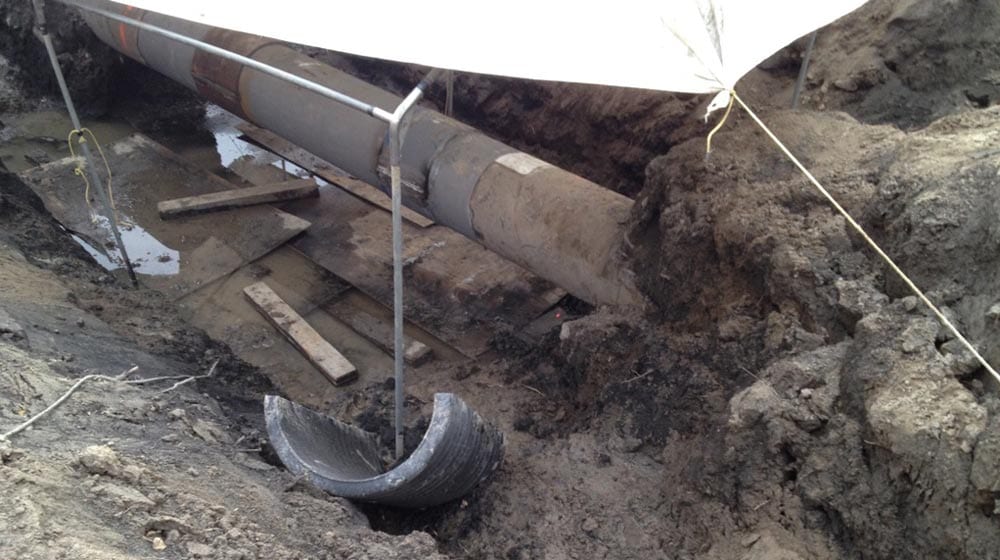
Since Kinder Morgan completed its work and covered over the pipeline, the couple says their land has not been the same. Noxious weeds interfere with the grain, decreasing the quality of their hay, and the once-smooth field has been replaced by rocks.“There’s going to be considerable work before we get back to having a full yield again,” says Antoine.The couple says the pipeline is not buried as deep and heat rises to the surface. A photo provided to APTN shows the property covered in snow – except for a winding bare path along the pipeline.The couple has asked for an environmental assessment to determine whether the giant pit impacted on surrounding wildlife, as it flooded with murky water.
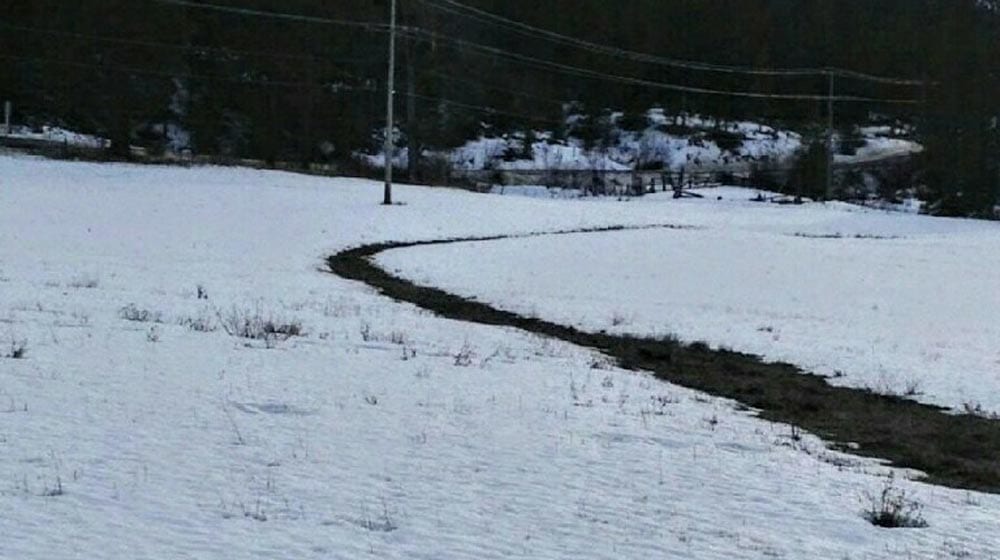
“We’ve not really had any answers to the full impact on our water,” says Antoine.According to a letter from Kinder Morgan dated Nov. 4, 2017, the company proposed $55,131 to cover the couple’s lost revenue over the years, including crop loss, land rental and Antoine and Joe’s time negotiating the issues.The couple has not signed the agreement. Antoine said she wants Kinder Morgan to do more work, like fixing the weed issues and returning “quality soil” to the site.In an emailed statement to APTN, Kinder Morgan said the Coldwater band won’t allow the company to complete remediation work on the site.“The incident being referenced is a small, contained historic contamination site on Reserve that was found in 2014 during routine maintenance work,” the statement reads. “We proceeded with remediation plans, as required by the National Energy Board (NEB) but the plans have been delayed due to an inability to receive consent by Coldwater for entry to the site to remediate.”Kinder Morgan has told the couple it will only complete further remediation work if Antoine signs a private deal that will give the company a right-of-way to her land.In that same Nov. 4 letter, the company says it will “mitigate and amend the soils along the pipeline trench to restore the crop capability similar to that on the surrounding field” if the couple signs the deal.Antoine says she can’t afford a lawyer, but the company has offered to pay for her arbitration fees.“They sent me a cheque which is still unopened,” she says. “At my age, I can’t afford – and I said that to Kinder Morgan – I can’t afford the high price of lawyers and I feel that perhaps that’s part of the leverage they use. They know most ordinary people can’t afford the legal fees that they enjoy.”Kinder Morgan’s additional work on the land is also “conditional on receiving consent and permission” from the Coldwater Band leadership.Coldwater has not signed a mutual benefit agreement with Kinder Morgan on the pipeline expansion. The band is among several First Nation communities, and the cities of Vancouver and Burnaby, that have filed a judicial review on the Trans Mountain pipeline expansion project.
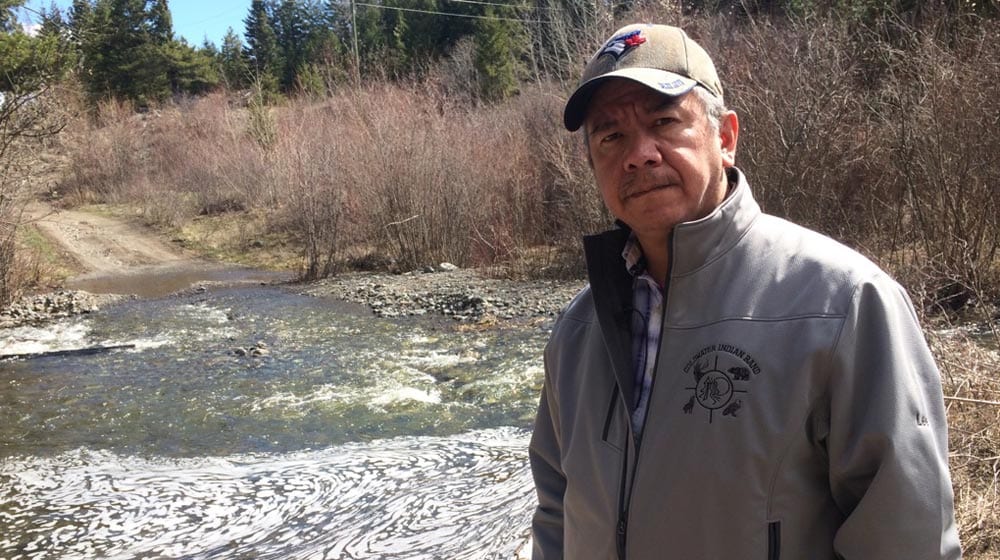
Chief Lee Spahan says the issue is “not if there’s gonna be a leak, it’s when there’s gonna be a leak.”“Our pumphouse is just metres away from the pipeline, which is a huge concern for the Coldwater band membership,” he says while standing by the Kwinshattin Creek that gurgles above the reserve’s aquifer.The existing pipeline runs through the reserve adjacent to the aquifer, as marked by the white-and-yellow Kinder Morgan signs. The proposed new line would run on the outskirts of the eastern side of the reserve above the aquifer.The chief would prefer Kinder Morgan reroute the line through the west side of the community, but is ultimately against the project if it risks endangering the aquifer.“The huge concern is the drinking water and we want to make sure that nothing, absolutely nothing impacts it because the source of the water feeds over 90 per cent of the community.”
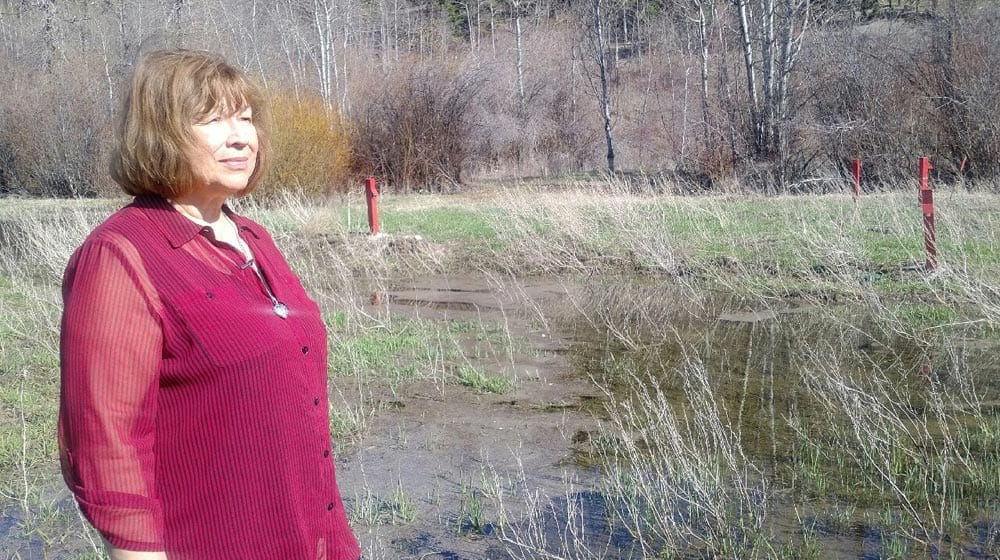
Kinder Morgan has created a catch-22 for the couple – sign our deal or we won’t fix your farmland.But Antoine says she’s not willing to defy her band’s stance on the pipeline and sign off on Kinder Morgan’s deal – even if it means remediating her property.“I feel that I’m caught between a rock and a hard place,” she says. “I certainly don’t want to leave this as a legacy to my children and have them feel stuck and just be left with something that they can’t fully enjoy the way they were accustomed to enjoy it.”Antoine has lived on that property for more than 30 years. She has memories of her children riding their horses and hiking through the area, picking wild mushrooms and berries with their grandmother.“There’s a wonderful natural soil up on top on the knoll for generations that used to be a very productive garden,” she says. “My daughter actually wanted to build a small cabin there and do some gardening and have that as a place to do it, but with the mess that’s here and the issue over water and soil contamination, I don’t know if she’ll see it in her lifetime.”I certainly hope she has that option.”- with files from Kenneth Jackson




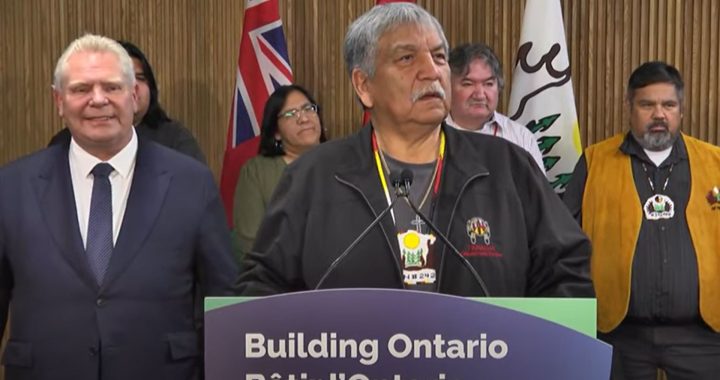
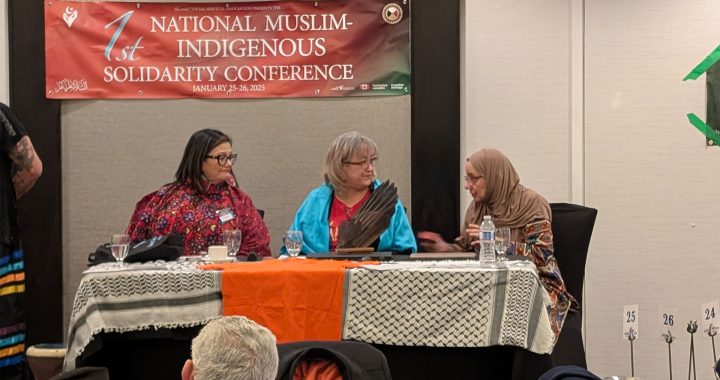





It’s clear from this interesting discussion that Janice Antoine needs independent legal advice to navigate any agreement signed with KM – an agreement that includes KM fully remediating the damage from the spill and bringing the surrounding soil up to pre-spill farming standards. Antoine and the Coldwater FN shouldn’t have to give anything – other than the access required – in return. KM should simply clean up its mess.
It’s clear from this interesting discussion that Janice Antoine needs independent legal advice to navigate any agreement signed with KM – an agreement that includes KM fully remediating the damage from the spill and bringing the surrounding soil up to pre-spill farming standards. Antoine and the Coldwater FN shouldn’t have to give anything – other than the access required – in return. KM should simply clean up its mess.
I think any deals/projects that be with the governments or companies, Indigenous people should seek out advise from other Indigenous leaders to protect all Indigenous lands and rights and find viable solutions to protect them so that they will not be taken advantage of. They have to keep in mind they have something governments and companies want and even though they are fully aware of the economic hardships Indigenous people face, Indigenous people should consult one another, nation to nation in establishing better deals that would benefit Indigenous people. If they are going to be part of this economy they need to stick together to get the best deals so that they are on the same playing field, that will take Indigenous people out of poverty, whether that be one reserve at a time. Indigenous people should/need to consult with one another and play hard ball as they do, hold them accountable as they would do to us if it were the other way around.
I think any deals/projects that be with the governments or companies, Indigenous people should seek out advise from other Indigenous leaders to protect all Indigenous lands and rights and find viable solutions to protect them so that they will not be taken advantage of. They have to keep in mind they have something governments and companies want and even though they are fully aware of the economic hardships Indigenous people face, Indigenous people should consult one another, nation to nation in establishing better deals that would benefit Indigenous people. If they are going to be part of this economy they need to stick together to get the best deals so that they are on the same playing field, that will take Indigenous people out of poverty, whether that be one reserve at a time. Indigenous people should/need to consult with one another and play hard ball as they do, hold them accountable as they would do to us if it were the other way around.
When the pipeline running through Antoine’s and the Band’s properties was laid, likely in the 1950’s, the rights of First Nations were not recognized. “Indians” did not have the right to vote until 1960- it’s not likely the band in question was even consulted. I find it impossible to believe they would have consented to a pipeline laid over their aquifer.
It is interesting that the talk of “right-of-way” – by a Texas company with no other connection to BC than a monetary investment to TM’s pipeline – is not ever questioned, but the land and water “rights” of people living on the land is considered obstructive.
When the pipeline running through Antoine’s and the Band’s properties was laid, likely in the 1950’s, the rights of First Nations were not recognized. “Indians” did not have the right to vote until 1960- it’s not likely the band in question was even consulted. I find it impossible to believe they would have consented to a pipeline laid over their aquifer.
It is interesting that the talk of “right-of-way” – by a Texas company with no other connection to BC than a monetary investment to TM’s pipeline – is not ever questioned, but the land and water “rights” of people living on the land is considered obstructive.
Please apply common sense to the real circumstances
First of all we are not provided ALL THE FACTS such as any existing agreements
For example what terms was KM allowed to build the original line, what are the respective rights of the BAND and the occupants(?)…..in the case of reserve lands the normal laws of ownership are not operative
In responding to the limited background we have been provided it makes me apprehensive that the BAND and Antoine have their own agenda.They really want the repair but want to be able to criticize KM as being irreponsible ..ie ” see how bad pipelines are”
The reference to the normal definitions of ” easement and right of way ” would not likely apply here given the fact that we are dealing with reserve lands the coincidental involvement of the federal indigenous legislation and the terms of the prevailing TREATY
AGAIN be careful in developing an opinion WITHOUT ALL THE FACTS
Please apply common sense to the real circumstances
First of all we are not provided ALL THE FACTS such as any existing agreements
For example what terms was KM allowed to build the original line, what are the respective rights of the BAND and the occupants(?)…..in the case of reserve lands the normal laws of ownership are not operative
In responding to the limited background we have been provided it makes me apprehensive that the BAND and Antoine have their own agenda.They really want the repair but want to be able to criticize KM as being irreponsible ..ie ” see how bad pipelines are”
The reference to the normal definitions of ” easement and right of way ” would not likely apply here given the fact that we are dealing with reserve lands the coincidental involvement of the federal indigenous legislation and the terms of the prevailing TREATY
AGAIN be careful in developing an opinion WITHOUT ALL THE FACTS
Mike why ruin a story about the big bad leaking pipeline and the Indians picking blueberries with facts ? This isnt even a story its manufactured anti pipeline propaganda
It is real…areyou just dumb…it is common knowldge km dont clean uo after themselves. Now they get to take what little land we have left…grrrrrr not gonna happen.
We said No.
Does the corporation of canada have JURISDICTION on your unceded territory. Ironic,kinder respects no access to fix leak of existing illegal pipeline(without consent) yet truedough is proposing to force a new illegal pipeline(without consent) o canada
I would argue that there is a difference between gaining access and requiring “right of way” on the property.
Mike why ruin a story about the big bad leaking pipeline and the Indians picking blueberries with facts ? This isnt even a story its manufactured anti pipeline propaganda
It is real…areyou just dumb…it is common knowldge km dont clean uo after themselves. Now they get to take what little land we have left…grrrrrr not gonna happen.
We said No.
So the family and band are denying access to the people who seem willing to resolve it and as a result are causing a delay… so an article is written that appears to shed bad light on kinder morgan. Admittedly i only have knowledge of what is printed in this article and not both sides but what i read is “we will not allow them the access to fix it but the company is bad because they are taking to long to fix it”. How do you suggest they fix this when they cannot gain access?
they want them to sign an agreement to put a passage way through their land, not access to enter…
The company wants them to sign a deal to gain access to their land, to put a roadway through their land so they have access anytime, and not access to fix the problem
I believe, if you re-read the article, it is the insistence by KM that they sign agreeing to something unrelated to simply fixing the problem caused by the leak.
They are not denying access to allow the company to fix it – they are denying a “right of way”. The company built the pipeline and should maintain it. If they built it, they should fix it. I assume they either built it illegally or they had a right of way at the time. Why would they want a new agreement unless they are asking for more than the original one?
I got the following from an explanation of a right of way: “A pipeline right-of-way is a piece of land with limited and specific uses that is conveyed by a right-of-way grant or easement by a current or past property owner to a pipeline company. The right-of-way in most cases is used to construct, maintain, operate, protect, inspect, maintain and/or replace one or more pipelines. The right-of-way grant (sometimes called an easement) is usually filed where deeds are filed in the county in which the pipeline is located. The right-of-way agreement (and/or easement) creates a permanent limited interest in the land. Rights-of-way vary in width; however, a right-of-way width of 50 feet is fairly common for Sunoco Pipeline L.P., though it can be greater depending on whether there is one pipeline or multiple pipelines within the right-of-way.
The pipeline rights-of-way are often recognizable as corridors that are cleared of trees, buildings or other structures except for pipeline markers. Another thing you might see is fenced and secured areas with some above ground piping; these secured areas provide access to valves along the pipeline system.
Rights-of-way must be kept free of buildings, trees, storage materials and other obstructions. Right-of-Way Clearing and tree trimming and removal are part of our routine maintenance, and are necessary to maintain the integrity of the pipeline and to facilitate ground and aerial inspection. If a pipeline crosses your property, please do not plant trees or shrubs within the right-of-way. Also, do not dig, store or place anything on or near the right-of-way without first having our personnel mark the location of the pipeline, stake the right-of-way and explain our construction guidelines to you.”
Does the corporation of canada have JURISDICTION on your unceded territory. Ironic,kinder respects no access to fix leak of existing illegal pipeline(without consent) yet truedough is proposing to force a new illegal pipeline(without consent) o canada
I would argue that there is a difference between gaining access and requiring “right of way” on the property.
So the family and band are denying access to the people who seem willing to resolve it and as a result are causing a delay… so an article is written that appears to shed bad light on kinder morgan. Admittedly i only have knowledge of what is printed in this article and not both sides but what i read is “we will not allow them the access to fix it but the company is bad because they are taking to long to fix it”. How do you suggest they fix this when they cannot gain access?
they want them to sign an agreement to put a passage way through their land, not access to enter…
The company wants them to sign a deal to gain access to their land, to put a roadway through their land so they have access anytime, and not access to fix the problem
I believe, if you re-read the article, it is the insistence by KM that they sign agreeing to something unrelated to simply fixing the problem caused by the leak.
They are not denying access to allow the company to fix it – they are denying a “right of way”. The company built the pipeline and should maintain it. If they built it, they should fix it. I assume they either built it illegally or they had a right of way at the time. Why would they want a new agreement unless they are asking for more than the original one?
I got the following from an explanation of a right of way: “A pipeline right-of-way is a piece of land with limited and specific uses that is conveyed by a right-of-way grant or easement by a current or past property owner to a pipeline company. The right-of-way in most cases is used to construct, maintain, operate, protect, inspect, maintain and/or replace one or more pipelines. The right-of-way grant (sometimes called an easement) is usually filed where deeds are filed in the county in which the pipeline is located. The right-of-way agreement (and/or easement) creates a permanent limited interest in the land. Rights-of-way vary in width; however, a right-of-way width of 50 feet is fairly common for Sunoco Pipeline L.P., though it can be greater depending on whether there is one pipeline or multiple pipelines within the right-of-way.
The pipeline rights-of-way are often recognizable as corridors that are cleared of trees, buildings or other structures except for pipeline markers. Another thing you might see is fenced and secured areas with some above ground piping; these secured areas provide access to valves along the pipeline system.
Rights-of-way must be kept free of buildings, trees, storage materials and other obstructions. Right-of-Way Clearing and tree trimming and removal are part of our routine maintenance, and are necessary to maintain the integrity of the pipeline and to facilitate ground and aerial inspection. If a pipeline crosses your property, please do not plant trees or shrubs within the right-of-way. Also, do not dig, store or place anything on or near the right-of-way without first having our personnel mark the location of the pipeline, stake the right-of-way and explain our construction guidelines to you.”
Hi my name is sylvia caribou i am a student in the Community Economic Diploma program and i have to look up an issue on the indigenous media about the trans mountain pipeline. i am seeking advice for the purpose of finding a solution. This one is interesting. Did they do anything for their farmland yet as of today, thank you.
Hi my name is sylvia caribou i am a student in the Community Economic Diploma program and i have to look up an issue on the indigenous media about the trans mountain pipeline. i am seeking advice for the purpose of finding a solution. This one is interesting. Did they do anything for their farmland yet as of today, thank you.